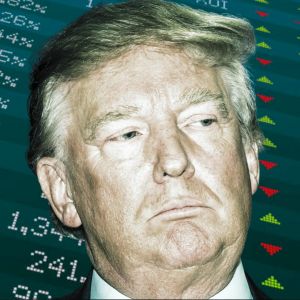Trump accused China of committing an “economically hostile act” after Beijing stopped buying U.S. soybeans, escalating tensions in a trade fight that’s already spreading across agriculture, shipping, and energy. In a fiery post on Truth Social, he wrote: “I believe that China purposefully not buying our Soybeans, and causing difficulty for our Soybean Farmers, is an Economically Hostile Act. We are considering terminating business with China having to do with Cooking Oil, and other elements of Trade, as retribution. As an example, we can easily produce Cooking Oil ourselves, we don’t need to purchase it from China.” China has been the largest buyer of U.S. soybeans for years, importing about 27 million metric tons valued at roughly $12.8 billion in 2024.But since May, Beijing has refused to purchase a single shipment. The halt came as the trade war between Washington and Beijing heated up again, with tariffs driving prices higher for Chinese importers.Instead, China began sourcing soybeans from Argentina and other South American producers. Coincidentally, Argentina lifted export taxes on the same day Trump’s administration announced a $20 billion currency swap with Buenos Aires. Hours later, Argentina’s President Javier Milei visited Trump at the White House. By the end of the day, the U.S. president had unleashed his public rebuke against China. Markets drop after Trump’s trade warning The timing of Trump’s post sent markets tumbling. The S&P 500 fell sharply by the end of the day, closing lower after a volatile session. Traders were already on edge following Trump’s warning on Friday that he would raise tariffs on Chinese imports in response to Beijing’s new export controls on rare earth minerals. Hours after that threat, he said he would impose an additional 100% tariff on Chinese goods starting November 1. But by Sunday, he changed tone, posting, “Don’t worry about China, it will all be fine!” Meanwhile, data showed China’s exports of used cooking oil hit record highs in 2024, and the U.S. accounted for 43% of the total. That number added to Washington’s frustration as Trump considered cutting ties in the cooking oil trade altogether. His comments deepened doubts about ongoing U.S.-China trade talks, already stalled after months of tit-for-tat measures. Beijing responded by introducing its own round of economic measures. It started collecting special port fees on U.S.-owned, operated, or built vessels, while exempting Chinese-built ships. Chinese state broadcaster CCTV explained that the new fees would apply to a vessel’s first port of entry for a single voyage or up to five voyages per year, with exceptions for empty ships entering for repairs. The move mirrored the U.S. policy announced earlier this year, when Trump’s administration approved similar fees on China-linked vessels to boost the U.S. shipbuilding sector. China hits back with sanctions and maritime countermeasures The standoff extended beyond soybeans and tariffs into the shipping industry.An investigation that began during the Biden administration had concluded that China used unfair practices to dominate global shipping and shipbuilding. That finding gave Trump the authority to impose penalties aimed at reducing Beijing’s control. China fired back by introducing identical port charges on U.S.-linked vessels the same day America’s fees took effect. Athens-based Xclusiv Shipbrokers said in a research note that the situation created a “spiral of maritime taxation” between the two economies, warning of disruptions to global freight flows. Shipping analyst Ed Finley-Richardson said operators were scrambling to reroute ships to avoid Chinese ports. He said some U.S. shipowners were trying to sell their cargo mid-voyage so vessels could divert elsewhere. Analysts estimated China’s state-owned COSCO would take the hardest hit, bearing almost half of the $3.2 billion in extra costs expected by 2026. Major international carriers like Maersk, Hapag-Lloyd, and CMA CGM reduced exposure by pulling China-linked ships off U.S. trade routes. American trade officials later lowered the proposed port fees after backlash from agriculture, energy, and shipping industries, which argued that the tariffs would raise costs for consumers and exporters alike. The U.S. Trade Representative (USTR) declined to comment. China’s commerce ministry responded Tuesday, saying, “If the U.S. chooses confrontation, China will see it through to the end; if it chooses dialogue, China’s door remains open.” Hours later, Beijing announced sanctions against five U.S.-linked subsidiaries of South Korea’s Hanwha Ocean, accusing them of supporting a U.S. investigation into China’s trade practices. Hanwha, which owns Philly Shipyard in the U.S. and builds Navy vessels, confirmed it was monitoring the situation after its stock plunged nearly 6%, as Cryptopolitan reported . Don’t just read crypto news. Understand it. Subscribe to our newsletter. It's free .















